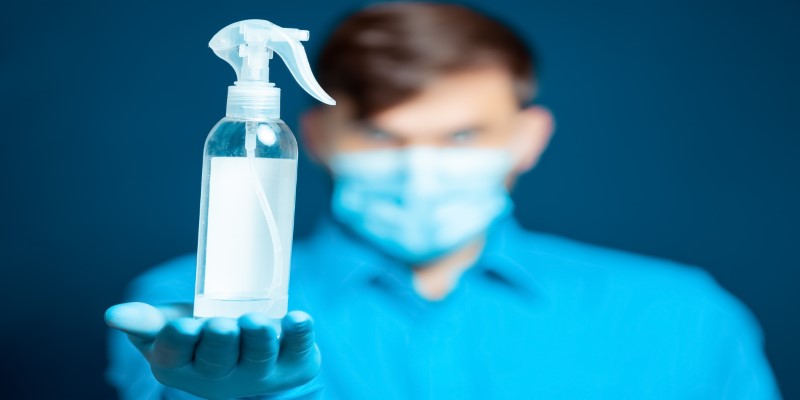Safeguarding Health: A Detailed Exploration of Common Antiseptics
Feb 07, 2024 By Madison Evans
Antiseptics are essential for hygiene and preventing infections in different places, like hospitals and daily activities. These chemicals are made to stop or kill tiny organisms in living tissues, lowering the chances of infection. In this article, we will explore why antiseptics are important, share examples that people commonly use, talk about how they are used, and mention times when it's better not to use them.
Understanding antiseptics is important for keeping things clean and avoiding getting sick. In places like hospitals, they help prepare for surgeries, care for wounds, and keep things germ-free. In everyday life, antiseptics are in products like hand sanitizers, which help people stay clean. However, it's good to be careful, especially if someone has allergies or a big wound that needs a doctor. Hop inside this article to know in depth about these.
Purpose of Antiseptics
Antiseptics' fundamental role lies in preventing the proliferation and dissemination of microorganisms in living tissues. Unlike disinfectants, formulated for use on inanimate objects, antiseptics are specifically designed to be applied to the skin or mucous membranes of humans and animals. The key objectives and purposes of antiseptics can be elucidated as follows:
Key Examples of Antiseptics
Antiseptics are chemical agents designed to inhibit or destroy microorganisms on living tissues, primarily to prevent infections. They find application in various settings, from healthcare facilities to everyday personal hygiene. Below are examples of commonly used antiseptics:

Hydrogen Peroxide
Hydrogen peroxide, with its distinctive enthusiasm, is a well-known antiseptic acknowledged for its wound-cleansing properties. When applied, it releases oxygen, assisting in the disinfection of minor cuts and scrapes. It is a common choice for households to clean and treat superficial injuries.
Iodine-Based Antiseptics
Povidone-iodine and iodine tincture are examples of iodine-based antiseptics exhibiting effectiveness against various microorganisms. Widely employed in healthcare settings, these antiseptics play a pivotal role in preoperative skin preparation and wound care, contributing to preventing infections.
Chlorhexidine
Chlorhexidine stands out for its enduring antimicrobial activity, making it a frequent choice in various medical applications. In surgical hand scrubs, skin disinfection before medical procedures, and oral care products like mouthwashes, chlorhexidine is vital in maintaining hygiene standards in healthcare environments.
Isopropyl Alcohol
Widely utilized as an antiseptic, isopropyl alcohol is known for its rapid action against microorganisms. Commonly found in first aid kits, it disinfects the skin before injections or minor surgical procedures. Its accessibility and efficacy make it a staple in healthcare and household settings.
Benzalkonium Chloride
Benzalkonium chloride is a versatile antiseptic effective against bacteria and viruses found in antiseptic wipes and solutions. Its common use in healthcare settings for skin disinfection underscores its reliability in preventing the spread of infections. Additionally, its presence in wipes makes it a convenient option for personal hygiene practices.
Tea Tree Oil
Known for its natural antiseptic properties, tea tree oil has been used traditionally for wound care. It exhibits antimicrobial activity and is often found in topical solutions and ointments for skin conditions. Its pleasant aroma and soothing properties make it a popular choice for individuals looking for natural alternatives in skincare.
Silver Nitrate
Silver nitrate, though less common, is utilized for its antiseptic properties, especially in certain medical procedures. It has a long history of use in preventing infections in newborns' eyes and is applied topically in specific medical settings. The unique trait of silver nitrate is its silver ions, which exhibit potent antimicrobial effects.
Honey:
Beyond its role in the culinary world, honey has been recognized for its natural antiseptic properties. Its ability to create an unfavorable environment for bacteria growth, coupled with its soothing properties, makes it an age-old remedy for wound care. Honey's viscosity helps create a protective barrier on wounds, promoting healing and reducing the risk of infection.
When to Avoid Antiseptics?
While antiseptics are generally safe for use, there are situations in which their application may be best avoided:

Allergic Reactions: Some individuals may be allergic to specific antiseptic agents. It is essential to be aware of known allergies and choose antiseptics to prevent adverse reactions.
Deep or Puncture Wounds: Antiseptics are suitable for minor cuts and abrasions, but deep or puncture wounds may require medical attention. In such cases, it is advisable to seek professional help rather than relying solely on antiseptic solutions.
Sensitive Areas: Avoid using strong antiseptics on sensitive areas, such as the eyes or mucous membranes, unless directed by a healthcare professional. These areas may be more susceptible to irritation.
Chronic Wounds: It is essential to consult with a healthcare provider for chronic wounds or persistent skin conditions. In some cases, certain antiseptics may hinder the healing process.
Pregnancy and Breastfeeding: Pregnant individuals or those breastfeeding should consult their healthcare providers before using antiseptics, as certain ingredients may pose risks to the developing fetus or nursing infant.
Underlying Health Conditions: Individuals with certain health conditions, such as compromised immune systems or diabetes, should seek guidance from healthcare professionals before using antiseptics, as these conditions may affect the body's response to such agents.
Repeated or Prolonged Use: Excessive or prolonged use of antiseptics may lead to skin irritation. It is advisable to follow recommended usage guidelines and seek medical advice if irritation persists.
Wrapping It Up!
Antiseptics play a pivotal role in preventing infections and promoting overall health. Their diverse range, from hydrogen peroxide to iodine-based solutions, allows for effective microbial control in various scenarios. Comprehending the appropriate occasions and methods for utilizing antiseptics is essential to optimize their advantages while mitigating potential risks.
Individuals and healthcare professionals contribute to the ongoing efforts to combat infections and maintain a healthy living environment by incorporating antiseptics into proper wound care, surgical procedures, and everyday hygiene practices. Hope you found this info worth reading. Stay tuned for more informative articles.







